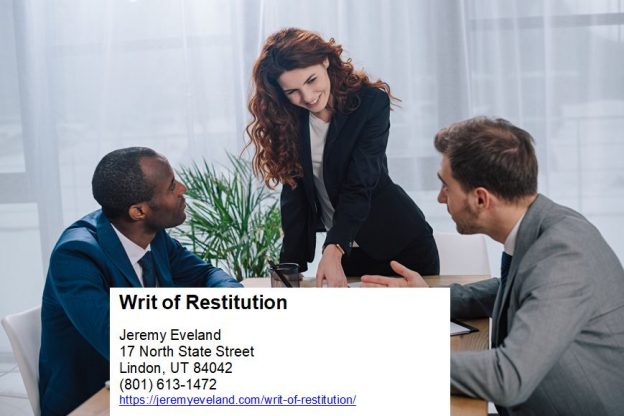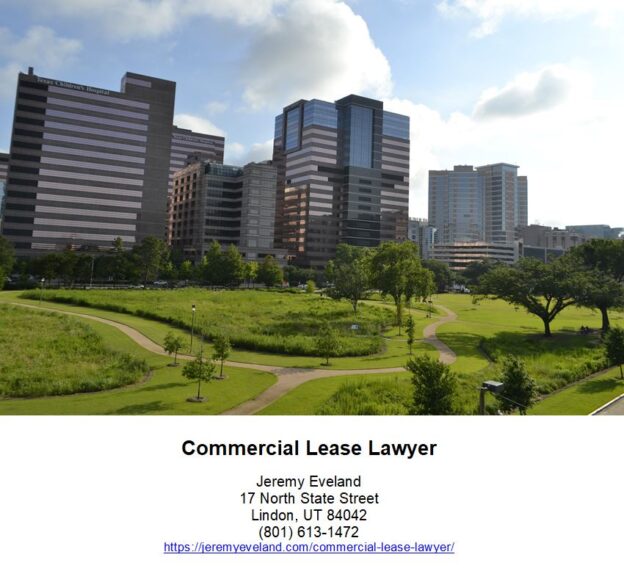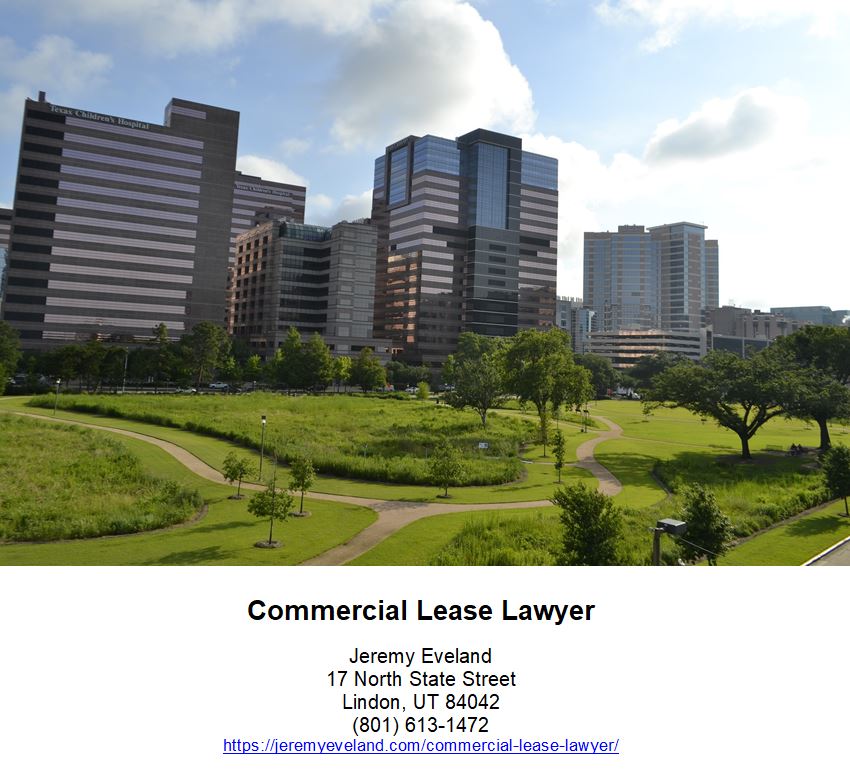Are you a tenant or landlord interested in negotiating commercial lease terms? Look no further! In this article, we will provide you with valuable tips to ensure a smooth and successful negotiation process. Whether you’re a tenant looking to secure favorable leasing terms or a landlord aiming to protect your interests, we’ve got you covered. From understanding common lease clauses to establishing a fair rental price, we will explore all the essential aspects of commercial lease negotiations. So, if you’re ready to dive into the world of leasing agreements and want expert guidance, keep reading and get ready to make that call to commercial real estate lawyer Jeremy Eveland.
Understanding the Importance of Negotiating Commercial Lease Terms

Why Negotiating Lease Terms is Essential
When it comes to entering into a commercial lease agreement, negotiating the terms is essential for both tenants and landlords. A lease agreement is a legally binding contract that outlines the rights and responsibilities of both parties. By negotiating the lease terms, both parties can ensure that their rights are protected, and that the agreement is fair and beneficial to all involved.
For tenants, negotiating lease terms allows them to secure favorable rental conditions and protect their business interests. By carefully considering factors such as rent structure, lease duration, maintenance responsibilities, and termination clauses, tenants can ensure that their space meets their needs and supports their business operations.
On the other hand, landlords also benefit from negotiating lease terms. By setting clear expectations for tenants and outlining their obligations, landlords can protect their property and minimize the risks associated with leasing out commercial space. Negotiating favorable terms also helps landlords attract desirable tenants and maintain positive long-term relationships.
The Impact of Lease Terms on Tenants and Landlords
Lease terms have a significant impact on both tenants and landlords. For tenants, favorable lease terms can mean lower costs, increased flexibility, and improved business operations. On the other hand, unfavorable lease terms can result in financial burdens, limited growth opportunities, and potential legal disputes. It is crucial for tenants to carefully review and negotiate lease terms to ensure they align with their business goals and objectives.
For landlords, lease terms determine the financial return on their investment and the overall success of their property. By negotiating lease terms that protect their interests, landlords can minimize vacancy rates, secure reliable tenants, and maximize their rental income. Additionally, well-negotiated terms help landlords maintain the value and marketability of their property, ensuring a steady stream of income.
Preparing for Lease Negotiations
Gathering Necessary Information
Before entering into lease negotiations, it is important to gather all the necessary information for informed decision-making. This includes understanding the local real estate market, knowing the current rental rates for similar properties, and researching the specific requirements and regulations in the locality. Gathering this information will help both tenants and landlords set realistic expectations and negotiate from an informed position.
Identifying Your Objectives
Clearly defining your objectives is crucial to the negotiation process. Tenants should identify their space requirements, budget limitations, and any specific needs related to their business operations. Landlords should also identify their desired rental income, preferred lease duration, and any specific requirements for their property. By understanding these objectives, both parties can negotiate with clarity and purpose.
Setting Realistic Expectations
Setting realistic expectations is key to a successful negotiation process. Both tenants and landlords should be aware of the market conditions and the specific challenges they may face during the negotiation. By setting realistic expectations, both parties can navigate the negotiation process with a proactive and collaborative mindset.
Key Lease Terms to Consider
Rent Structure and Payment Terms
The rent structure and payment terms are fundamental aspects of a commercial lease agreement. Tenants should carefully consider the amount of rent, frequency of payment, and any additional charges or fees associated with the lease. Landlords, on the other hand, should ensure that the rent reflects the market value of the property and covers any expenses associated with maintaining the premises.
Lease Duration and Renewal Options
The lease duration and renewal options should be carefully negotiated to ensure flexibility for both tenants and landlords. Tenants may require shorter lease terms to accommodate their business’s growth or changing needs, while landlords may prefer longer lease terms for stability and consistent rental income. Including renewal options allows for greater flexibility and continued occupancy if desired by both parties.
Maintenance and Repairs
The responsibility for maintenance and repairs should be clearly defined in the lease agreement. Tenants should negotiate for reasonable maintenance expectations and ensure that major repairs are the landlord’s responsibility. Landlords, on the other hand, may require tenants to maintain the premises and make necessary repairs, ensuring the property is well-maintained throughout the lease term.
Security Deposits and Guarantees
Security deposits and guarantees provide assurance for landlords against potential damages or lease defaults. Tenants should negotiate for a reasonable security deposit amount and explore alternatives such as letters of credit or personal guarantees. Landlords should also consider the financial stability and creditworthiness of the tenants when deciding on the security deposit requirements.
Assignment and Subletting
The ability to assign or sublet the space can be crucial for tenants, especially if their business needs change or they require additional income. Tenants should negotiate for the flexibility to assign or sublet the space under certain conditions, while landlords should exercise caution and ensure they have control over who occupies their property.
Termination and Default
Termination and default clauses outline the conditions under which the lease can be terminated and the remedies available in case of default. Tenants should negotiate for fair termination conditions, such as allowing for early exit with minimal penalties under certain circumstances. Landlords should protect their interests by including remedies for non-payment or other breaches of the lease.
Insurance Requirements
Insurance requirements should be clearly outlined in the lease agreement to protect both tenants and landlords. Tenants should ensure they have adequate liability insurance coverage and consider adding the landlord as an additional insured party. Landlords should require proof of insurance and consider additional coverage to protect their property.
Use and Alterations
The permitted use of the space and the ability to make alterations or improvements should be negotiated to meet the specific needs of the tenant. Tenants should negotiate for broad allowable uses and the ability to make necessary alterations, while landlords may require approval for any modifications to ensure the property’s integrity and compliance with regulations.
Open Clauses and Exclusivity
Open clauses and exclusivity provisions can have a significant impact on tenants’ business operations. Tenants should negotiate for exclusivity provisions that prevent the landlord from leasing nearby units to direct competitors. Landlords should consider open clauses to allow for future flexibility in leasing adjacent units or expanding the tenant mix.
Dispute Resolution
Dispute resolution mechanisms should be included in the lease agreement to efficiently handle potential conflicts. Both parties should negotiate for a fair and practical resolution process, such as mediation or arbitration, to avoid lengthy and costly litigation. Clarifying the dispute resolution process in advance can help maintain a positive landlord-tenant relationship.
Tips for Tenants
Assessing Your Needs and Space Requirements
Before entering into lease negotiations, tenants should thoroughly assess their needs and space requirements. This includes considering factors such as location, size, layout, access to amenities, and any specific requirements related to their business operations. Understanding these needs will help tenants negotiate for the right space that supports their business objectives.
Researching the Market
Researching the local real estate market is crucial for tenants. By understanding the current rental rates, vacancy rates, and market trends, tenants can negotiate from an informed position. This research will also help tenants assess the competitiveness of the lease terms proposed by the landlord.
Engaging the Services of a Qualified Real Estate Agent
Working with a qualified real estate agent can provide invaluable support during the lease negotiation process. Real estate agents have a deep understanding of the market, access to listings, and experience in negotiating lease terms. They can assist tenants in finding suitable space, evaluating lease offers, and negotiating favorable terms.
Reviewing and Understanding the Lease Agreement
Carefully reviewing and understanding the lease agreement is essential for tenants. It is important to pay attention to every detail, including the rights and obligations of both parties, any additional charges or fees, and the terms related to termination or default. Seeking legal advice to ensure a clear understanding of the lease agreement is highly recommended.
Seeking Legal Advice
Seeking legal advice from a commercial real estate lawyer is highly recommended for tenants. A lawyer can review the lease agreement, identify any potential issues, and advise on the negotiation process. Their expertise can help tenants protect their rights, understand their obligations, and ensure a fair and beneficial lease agreement.
Negotiating Favorable Lease Terms
Negotiating favorable lease terms requires effective communication and advocacy. Tenants should clearly articulate their needs and objectives, present supporting market research and data, and be prepared to compromise on certain points. By negotiating in a respectful and collaborative manner, tenants can increase their chances of securing favorable lease terms.
Considering Flexibility and Future Growth
When negotiating lease terms, tenants should consider their future growth plans and the flexibility needed to accommodate changes in their business. Negotiating for options such as expansion rights, renewal options, and termination clauses can provide the necessary flexibility to adapt to evolving business needs.
Anticipating Additional Costs
In addition to the base rent, tenants should anticipate and negotiate for any additional costs associated with the lease. This may include common area maintenance fees, property taxes, utilities, insurance premiums, or any other charges not explicitly stated in the lease agreement. Understanding and negotiating these costs upfront can prevent unexpected financial burdens.
Protecting Your Rights as a Tenant
Tenants should negotiate for specific rights that protect their interests and ensure a favorable leasing experience. This may include the right to quiet enjoyment, the right to reasonable notice for property inspections or repairs, and the right to dispute resolution through mediation or arbitration. Clearly outlining these rights in the lease agreement will help tenants maintain a fair and positive landlord-tenant relationship.
Documenting Agreements in Writing
It is crucial for tenants to ensure that all negotiated agreements and changes to the lease terms are documented in writing. Verbal agreements or informal understandings may not hold up in court if a dispute arises. Tenants should request written amendments or addendums to the lease agreement to ensure clarity and enforceability.
Tips for Landlords
Determining Property Value and Marketability
Before initiating lease negotiations, landlords should determine the value and marketability of their property. This includes assessing the current rental rates for similar properties, understanding the demand and vacancy rates in the locality, and conducting a thorough assessment of the property’s condition and amenities. This information will help landlords set realistic rental expectations for potential tenants.
Preparing Lease Documentation
Preparing comprehensive lease documentation is crucial for landlords. Lease agreements should be drafted with the assistance of legal professionals to ensure compliance with local regulations and to protect the landlord’s interests. Landlords should clearly outline their expectations, rights, and responsibilities in the lease agreement, leaving no room for ambiguity or disputes.
Understanding Tenant Needs and Market Trends
Understanding tenant needs and market trends is essential for landlords to attract and retain desirable tenants. By staying informed about the local business climate, demographic trends, and tenant preferences, landlords can tailor their leasing strategy and lease terms to meet tenant demands. This proactive approach helps landlords maintain a competitive edge in the market.
Conducting Due Diligence on Prospective Tenants
Conducting due diligence on prospective tenants is critical for landlords. Assessing a tenant’s financial stability, creditworthiness, and track record can help landlords determine the tenant’s ability to meet their obligations under the lease agreement. Background checks, financial statements, and references can provide valuable insights into a tenant’s reliability.
Working with Legal and Real Estate Professionals
Working with legal and real estate professionals can provide valuable support to landlords. Real estate agents can assist in marketing the property, attracting potential tenants, and negotiating lease terms. Lawyers specializing in commercial real estate can review lease agreements, advise on legal obligations, and represent the landlord’s interests throughout the negotiation process.
Negotiating Reasonable and Favorable Terms
Landlords should approach lease negotiations with a focus on maintaining positive long-term relationships with tenants. By being open to reasonable requests and demonstrating flexibility, landlords can increase their chances of securing desirable tenants and minimizing vacancy rates. Constructive and collaborative negotiations can lead to mutually beneficial lease terms.
Mitigating Risks and Minimizing Liability
Mitigating risks and minimizing liability is a top priority for landlords. This includes ensuring appropriate insurance coverage, conducting regular property inspections, and promptly addressing maintenance or repair issues. By taking proactive steps to protect the property and comply with legal requirements, landlords can minimize the risks associated with leasing commercial space.
Securing Adequate Insurance Coverage
Landlords should secure adequate insurance coverage to protect their property and minimize liability. This includes general liability insurance and property insurance, as well as additional coverage for specific risks such as natural disasters or tenant-related damages. Reviewing insurance policies regularly and ensuring compliance with insurance requirements in the lease agreement is crucial.
Monitoring Tenant Compliance
Landlords should actively monitor tenant compliance with the lease agreement to prevent potential breaches and ensure smooth operations. This includes conducting periodic inspections, promptly addressing any non-compliance issues, and maintaining open communication channels with tenants. By fostering a positive landlord-tenant relationship and addressing issues proactively, landlords can minimize disruptions and conflicts.
Establishing Open Communication Channels
Establishing open communication channels with tenants is essential for landlords. This includes promptly responding to tenant inquiries or concerns, providing clear channels for reporting maintenance issues, and ensuring tenants have access to essential information. Open and transparent communication helps build trust and maintain a positive working relationship.

Common Pitfalls to Avoid
Inadequate Due Diligence
Failing to conduct adequate due diligence on the property, the market, and prospective tenants can lead to unfavorable lease terms or unreliable tenants. Both tenants and landlords should invest time and effort in researching, assessing risks, and gathering information to make informed decisions.
Failure to Understand Lease Terms
Not fully understanding the lease terms can result in unexpected obligations, financial burdens, or disputes. It is crucial for both tenants and landlords to carefully review and seek clarification on any ambiguous or unfamiliar terms in the lease agreement. Seeking legal advice can help ensure a clear understanding of the obligations and rights outlined in the lease.
Overlooking Hidden Costs
Failing to consider and negotiate for hidden costs associated with the lease can result in financial strain. Both tenants and landlords should anticipate and negotiate for additional costs, such as common area maintenance fees, utilities, or insurance premiums. By clarifying these costs upfront, both parties can avoid unexpected financial obligations.
Failure to Seek Legal Advice
Not seeking legal advice during lease negotiations can lead to unfavorable terms or legal disputes. Engaging the services of a commercial real estate lawyer can provide invaluable support and expertise throughout the negotiation process. Lawyers can review lease agreements, advise on legal rights and obligations, and provide guidance on negotiation strategies.
Rushing the Negotiation Process
Rushing through the negotiation process can lead to oversights or missed opportunities for favorable terms. Both tenants and landlords should allocate sufficient time to thoroughly review and negotiate the lease agreement. Taking the time to consider all aspects, seek advice when needed, and negotiate with a collaborative mindset can lead to better outcomes for both parties.
Negotiating from a Weak Position
Entering into lease negotiations from a weak position can put either party at a disadvantage. It is important to determine your objectives and understand your leverage before starting negotiations. Both tenants and landlords should be prepared to walk away from a lease agreement if the terms are not favorable or if they do not align with their overall objectives.
Ignoring Tenant or Landlord Rights
Ignoring the rights and obligations of either party can result in disputes and strained relationships. Both tenants and landlords should be aware of their respective rights and obligations outlined in the lease agreement, as well as any additional legal requirements. Acknowledging and respecting these rights will help maintain a fair and positive landlord-tenant relationship.
Lack of Clear Documentation
Failing to document negotiated agreements or changes to the lease terms can lead to misunderstandings or disputes in the future. Both tenants and landlords should ensure that any modifications or agreements reached during the negotiation process are documented in writing. This clear documentation will provide clarity and enforceability if issues arise.
Failure to Review and Update Lease Terms
Lease terms should be periodically reviewed and updated to reflect changing business needs or market conditions. Both tenants and landlords should regularly assess the lease agreement and consider potential amendments or adjustments to ensure the continued success and satisfaction of both parties.
Not Considering Future Business Needs
Failing to consider future business needs can result in limited growth opportunities or the need for premature lease termination. Tenants should negotiate for flexibility in terms of expansion rights, renewal options, or termination clauses to accommodate potential changes in their business. Landlords should be open to discussing and negotiating these provisions to attract and retain desirable tenants.
Seeking Professional Guidance
The Role of a Commercial Real Estate Lawyer
A commercial real estate lawyer plays a crucial role in lease negotiations by providing legal expertise, guidance, and advocacy. They can assist tenants and landlords by reviewing and drafting lease agreements, advising on legal rights and obligations, and representing clients in dispute resolution processes.
When and Why You Need a Lawyer
Engaging a commercial real estate lawyer is highly recommended for both tenants and landlords during lease negotiations. Lawyers can provide guidance and support throughout the process, ensuring legal compliance, protecting rights, and advocating for favorable terms. Their expertise can help mitigate risks, prevent disputes, and ensure a smooth leasing experience.
How a Lawyer Can Assist in Negotiations
A lawyer can assist in lease negotiations by conducting legal due diligence, reviewing and drafting lease agreements, and advising on negotiation strategies. They can identify potential issues, recommend amendments or additions to the lease terms, and negotiate on behalf of their client. A lawyer’s expertise can help level the playing field and achieve favorable outcomes.
Ensuring Compliance with Legal Requirements
A commercial real estate lawyer can ensure compliance with legal requirements throughout the lease negotiation process. They can review lease terms for compliance with local regulations, advise on fair housing laws, zoning regulations, and other legal obligations. Their guidance ensures that both tenants and landlords operate within the bounds of the law.
Reviewing and Drafting Lease Agreements
One of the key roles of a commercial real estate lawyer is to review and draft comprehensive lease agreements. Lawyers can ensure that the lease documents accurately reflect the negotiated terms, clearly outline the rights and responsibilities of both parties, and provide legal protection for their clients. Their expertise ensures that all necessary clauses and provisions are included and enforceable.
Handling Disputes and Mediation
In case of disputes or conflicts arising from the lease agreement, a lawyer can provide dispute resolution services. This includes representing clients in mediation or arbitration proceedings, negotiating settlements, and, if necessary, representing clients in court. A lawyer’s experience in handling commercial lease disputes is invaluable in minimizing legal risks and achieving satisfactory resolutions.

Conclusion
Negotiating commercial lease terms is essential for both tenants and landlords. By carefully considering the key lease terms, preparing for negotiations, and seeking professional guidance, both parties can secure favorable lease agreements that meet their needs and protect their interests. Tenants can ensure that their space supports their business operations and growth, while landlords can attract desirable tenants and safeguard their property investments. With proper preparation, clear communication, and a collaborative mindset, lease negotiation can be a positive and mutually beneficial process.



























